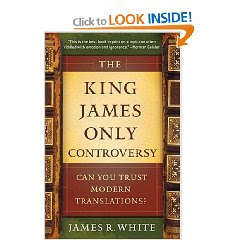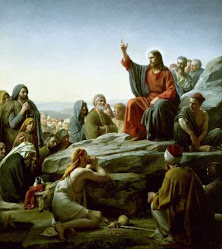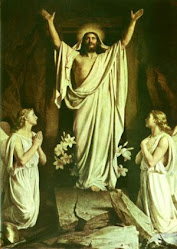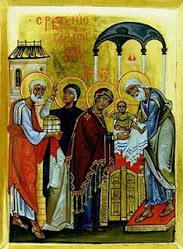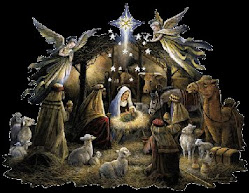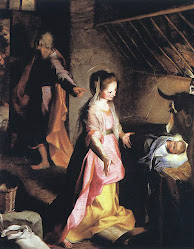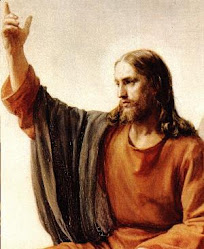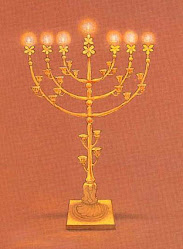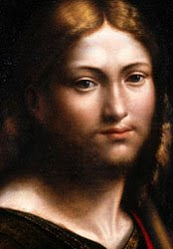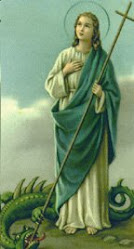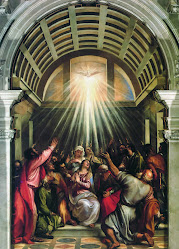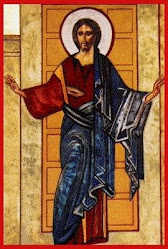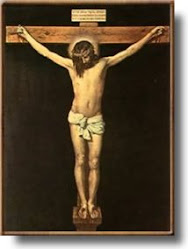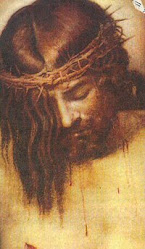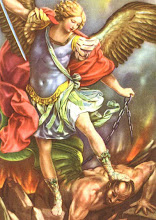THE PROMISE KEEPERS
Dear Promise Keepers ~
I am a Stranger and a Pilgrim on the earth, having left the City of Destruction (which will soon be burned with fire) and do seek a better country, that is an Heavenly, wherein dwelleth Righteousness. I have read in my Book, The Holy Bible, that the coming of the Lord draweth nigh, which Revelation doth cause me to rejoice with Joy unspeakable and full of Glory. Indeed, I fain would be clothed with Immortality and to behold alway the face of Him who died on a Cross for my sins. Yea, this expectation would be all my Joy were it not for grievous thoughts which do assail me regarding certain travelers I have met with on my journey. These liberal-minded professors have not entered in at the Strait Gate, wherein I was instructed to go, that I may be eased of my Burden of Sin, but hath climbed up some Other Way. Even so, such Vain Persons are fully persuaded that the King of the Celestial City will receive them and bestow upon them the Promised Inheritance, which is incorruptible, undefiled and fadeth not away.
The first of these benighted souls is Mr. Worldly Wiseman, who doth abide in the town of Morality, which is under the rule of Legality. The next is Wanton Professor, who liveth in Pleasure being dead even while he liveth. And finally there is Ignorance, who will not endure Sound Doctrine that he may grow thereby, but walketh in the Vanity of his Own Mind. These three fellows Esteem Themselves more highly than they ought and ~ professing to be Wise ~ knoweth not that they are Fools. Methinks such men are greatly deceived in that they presume the King of yonder Celestial City will grant unto them Life Eternal when, of a truth, they will be sore ashamed before Him at the very Throne of Judgment. For many Deceivers are gone out into the world which through great swelling words of Vanity do promise them Life. Such are the Servants of Corruption that, verily, make of their disciples twofold more the Children of Hell than themselves. For this cause, I am of a mind to bid these beguiled fellows to an assembly of Promise Keepers, but must needs first inquire by what particular doctrine thy organisation doth seek to bring such Graceless persons to Christ.
Your Fellow Servant,
Christian
--------------------------------------------------------------------------------
PK PROMISE
KEEPERS
MEN OF INTEGRITY
Dear Chris,
We appreciate your interest in our organization, which would welcome your fellow travelers. Perhaps you may be overly harsh in assuming that such sincere persons are without hope and without Christ in this world. We would not be so intolerant, but would present to them a heart-warming message in the exciting and non-threatening atmosphere of a familiar sports arena. It is the purpose of the Promise Keepers to promote a contemporary version of Christianity in a doctrinally-free, recreational and multimedia setting. At Promise Keepers conferences, prominent Christian leaders like Chuck Colson assure the men, "If you trust in God it doesn’t matter what religion or race you are, we all belong to each other." Our ecumenical message is carefully designed so as not to offend, but to include all in the great worldwide move toward religious unity.
For example, Mr. Worldly Wiseman would find common interests with many Roman Catholics and Mormons who are encouraged by their churches to attend Promise Keepers conferences. Their particular brand of "faith" is never challenged as long as they profess to "love Jesus." Modeling these works-based religions, Promise Keepers requires that each member make Seven Promises which he tries to keep with the help of mentors. Such carnal methods of attaining to holiness were adopted from the rule of Legality over the town of Morality, where Mr. Worldly Wiseman resides. He will no doubt be familiar with such Promises, and be already hard at work trying to keep many of them.
Wanton Professor, we would suspect, suffers from being spiritually challenged. Instead of confronting his condition, which others would harshly label ‘sinful,’ Promise Keepers provides weekly encounter groups for the men to explore their masculinity in a psychological context. Rather than overwhelming Wanton with the deep truths of the Bible, he would be given reading materials that are better suited to his interests, such as The Masculine Journey, by Robert Hicks. This revolutionary book would inform him that Jesus was lustful just like he is, and introduce him to a host of alternatives to repentance, such as initiation rites, male-bonding and taking of oaths. In addition, The Masculine Journey and Study Guide would refer him to the secular men’s movement, where he may find more agreeable fellowship than a strict Bible-teaching church offers.
Ignorance will surely agree with many of the informative articles in our monthly publication, the New Man. Features such as "Fathers, Fossils and Faith" (1) provide skeptics an intellectually stimulating defense of "Biblical" evolution in contrast to the less scientifically supported view that is presented in Genesis 1. Renewed interest in pagan rites is also part of Promise Keepers’ program as we strive to incorporate the fashionable esoteric practices of New Age spiritualism. Our leaders received their training in the Vineyard Movement, which has been on the vanguard of the occult revival within the Church. In our efforts to further update the narrow doctrinal position of traditional Christianity, Point Men are assigned to local churches and communities who have been trained to pressure pastors to break down all denominational walls. Such modernization of the church we hope will provide easier access and travel for many, like your friends, who prefer the Broad, rather than the Narrow Way.
~ The Promise Breakers
"They kept not the covenant of God and refused to walk in his law." Psalm 78:10
Promise Keepers is a non-denominational parachurch organization, formed in 1990 to "celebrate Biblical manhood and motivate men toward Christ-like masculinity." Last year, nearly 1.1 million men attended Promise Keepers events at 22 stadiums around the United States. The movement has grown exponentially in the six years since it was founded by Bill McCartney, who was then the head football coach at the University of Colorado. It now has a full-time staff of 430 at its headquarters in Boulder, Colorado and an annual budget of $97 million. The headquarters produces videos and a radio show, maintains a Web site, publishes books and several newsletters, and keeps in contact with 38 state offices and a handful of international affiliates. Sixty percent of its budget comes from men who pay $60 apiece to attend the stadium events and the remainder from donations and sales of instructional materials. (2)
Promise Keepers plans to expand its outreach globally. Last summer, seventeen men from four countries that hold affiliate or near-affiliate status (Canada, Australia, New Zealand and South Africa) met at the PK headquarters in Colorado. Promise Keepers’ December 1996 New Man magazine reported that representatives of 30 nations have made official inquiries about forming a Promise Keepers organization in their countries.
President Clinton has endorsed the Promise Keepers movement on the McNeil-Lehrer Report and Hillary Clinton praised this non-denominational ministry to men in her book, It Takes a Village. (3) The L. A. Times ran a favorable article and the New York Times gave Promise Keepers front page recognition. A New Age Journal article noted that Promise Keepers combined the secular men’s movement (founded by New Age poet Robert Bly) with the political evangelicalism of Pat Robertson. (4) And the Atlanta Journal-Constitution gave the following appraisal: "Promise Keepers combines the Jesus Saves preaching of Billy Graham with the male-bonding message of Robert Bly, the call for racial conciliation of Martin Luther King, Jr., and the marital advice of Ann Landers." (5)
The Vineyard Movement
Bill McCartney founded the Promise Keepers through the inspiration of his Vineyard pastor, James Ryle. Randy Phillips, the president of Promise Keepers, is also a member of James Ryle’s Vineyard Fellowship. James Ryle claims to be a modern prophet with revelatory powers. His book, A Dream Come True: A Biblical Look at How God Speaks Through Dreams and Visions, forwarded by Bill McCartney, encourages Christians to seek Jesus through dreams and visions. (6) At a 1990 Vineyard Harvest Conference in Denver, Rev. Ryle stated that God had instructed him to reveal to the church that the Beatles and their music were the result of a special anointing of the Holy Spirit - and that God was looking for others upon whom to place that anointing in order to bring about a worldwide revival through music --
"The Lord has appointed me as a lookout and shown me some things that I want to show you…The Lord spoke to me and said, 'What you saw in the Beatles -- the gifting and the sound that they had -- was from me…It was my purpose to bring forth through music a worldwide revival that would usher in the move of My Spirit in bringing men and women to Christ…" (7)
In an evaluation, entitled "Promise Keepers: Growth and Caution," Chris Corbett of Point of View radio ministry chronicled the connection between Promise Keepers and the Vineyard Movement. This profile of the Vineyard, in fact, describes the doctrinal foundation upon which the Promise Keepers Movement was built:
"The Vineyard movement of churches is controversial even within its Pentecostal base. It has been labeled ‘hyper-Pentecostal’ by its detractors, which have included figures such as Chuck Smith of Calvary Chapel and evangelist David Wilkerson. Currently, the Vineyard is a major conduit for the ‘Holy Laughter Movement’ in which those said to be filled with the Holy Spirit during a meeting might begin laughing uncontrollably, becoming paralyzed, roar like a lion or howl and bark like a dog.
"Promise Keepers founder Bill McCartney's pastor, James Ryle, who is on the Board of PK, is a highly controversial figure. His participation in the ‘Laughing Revival’ was written up in a Washington Post article (11/18/95) about the Laughing Movement at the Pasadena Vineyard Christian Fellowship: At the Pasadena church, James Ryle, chaplain of the University of Colorado football team, is telling the congregation how Jesus freed him from his own demons -- growing up in an orphanage and serving jail time for selling drugs. He tells many jokes about his missing middle finger, lost to a lawn mower. There are waves of tear-wiping laughter. Ryle makes sound effects, including some animal noises. He snaps his fingers, bangs the podium, paces and tells how God will appear here in suits of fire, oil, water. ‘You will feel! And the glory of the Lord will put you down!’ (A Rush of Ecstasy and Alarm, Carol McGraw)
"The Vineyard movement has been closely associated with the signs and wonders means of evangelism. Founder John Wimber follows closely the doctrines of George Eldon Ladd who was a professor of Biblical Theology at Fuller Theological Seminary in Pasadena, California. Ladd introduced radically new ideas of the kingdom, redemption and Christian unity. According to The Doctrines of the Kingdom of God, by Carl Widrig (1995), . . . Ladd’s ‘gospel of the Kingdom’ had a tendency to distract Ladd away from emphasizing the saving information of the gospel of Jesus' death on the cross." (8)
The Vineyard Movement has assumed the Gnostic mantle of William Branham, George Warnock, Paul Cain and others, who formerly tried to introduce Latter Rain/Manifest Sons of God teachings into the Pentecostal movement. Recently, when Kansas City Prophets Bob Jones and Earl Paulk were exposed for moral failure and Rev. Ernie Gruen challenged the error of modern false prophets, John Wimber provided a covering for their sin through affiliation with Vineyard Ministries. The issues of fornication and heresy were never dealt with and these prophets continue to promote their false doctrines through the Vineyard Fellowship.
The Word of God has carefully defined the eligibility criteria for those who shepherd the flock of God. I Thessalonians 5:12 commends believers to "know them which labour among you." However, leaders of parachurch ministries are often protected from scrutiny. I Timothy 3 sets forth precise qualifications for an elder candidate, who must be "above reproach" and "one that ruleth well his own house, having his children in subjection with all gravity (for if a man know not how to rule his own house, how shall he take care of the church of God?)…" A secular magazine, GQ, noted that Bill McCartney is "the only major college football coach in America with two illegitimate grandchildren sired by two different players upon his only daughter." (9) When the requirements of Scripture are ignored in the local church, the spiritual body becomes dysfunctional. Yet many parachurch leaders like Bill McCartney, who would not qualify as elders of a local church, are shepherding millions of Christians worldwide. In addition they receive millions of dollars in tithe money that rightfully belong to local churches. Jesus identified the hireling as a shepherd who does not receive his authority lawfully -- by the high standard given in the Word of God:
"He that entereth not by the door into the sheepfold, but climbeth up some other way, the same is a thief and a robber." (John 10:1)
The Ecumenical Movement
After the September, 1996 conference in New York, the Promise Keepers issued a press release:
"(Queens, NY) -- Like an army of Christian crusaders, 34,600 highly motivated missionaries and nearly 2,500 volunteers were turned loose on the New York metropolitan area today with the closing of the two-day Promise Keepers Conference at Shea Stadium. A nationwide radio broadcast on 398 stations reached over 250,000 listeners per quarter hour, while a strong national and international media presence assured the message would reach millions more…" (10)
What is the spiritual "message" that has almost overnight catapulted thousands of men across the nation to become missionaries to their cities and has also attracted the attention of national and international media? The multi-ethnic gathering of men in New York City heard from several popular Christian speakers, including Charles Colson, formerly a key political aide to President Nixon and the founder of Prison Fellowship. Colson shared the "message of Jesus" which he learned in jail: "If you trust in God, it doesn’t matter what religion or race you are, we all belong to each other." (11)
Perhaps this unifying message best explains the favorable coverage given to Promise Keepers in the secular press and the political arena. The message of Jesus Christ who said, "I am the way, the truth and the life: no man cometh unto the Father but by me." (John 14:6) is politically incorrect today. When Charles Colson received the $1 million Templeton Prize for Progress in Religion, presumably for his co-authorship of The Evangelicals and Catholics Together Document, he quoted John 14:6a -- but omitted the rest of the verse!
The Promise Keepers statement of purpose is: "To unite men through vital relationships to become godly influences in their world by making promises to Jesus Christ and to one another that last a lifetime." In order to become godly influences in their world, the men must keep the sixth of "Seven Promises of a Promise Keeper":
"A Promise Keeper is committed to reaching beyond any racial and denominational barriers to demonstrate the power of biblical unity . . .A Promise Keeper is willing to cross over the lines that have divided the church and meet with at least one man of a different race or denomination at least once a month."
Overseeing the implementation of the Promise Keepers’ agenda are Point Men or Ambassadors who are assigned to local churches and communities. The Ambassador Candidate booklet states:
"Because Promise Keepers is committed to building relational bridges, Ambassadors must avoid negative political and denominational remarks and discussions . . . walls of denominationalism are difficult to break down -- this process may take six months to a year." (12)
Many pastors have reluctantly yielded to the pressure placed upon them by these change agents, who exert substantial influence and generate enthusiasm for Promise Keepers within evangelical churches.
Those who benefit most from Promise Keepers’ ecumenical orientation are Catholic and Mormon leaders, who see in the movement an opportunity to build their own churches. They actively encourage their men to attend rallies and to form PK groups within their churches. After studying the feasibility and propriety of utilizing Promise Keepers at the Catholic parish level, Cardinal Roger Mahoney of Los Angeles concluded --
"There is no ‘doctrinal’ issue which should cause concern to the Catholic church. Promise Keepers places a very strong emphasis on returning to your own church, congregation or parish and becoming an active layman. There is no attempt at proselytizing or drawing men away from their faith to another church . . . The Promise Keepers seems to me to be a wonderful way to prepare for the Third Millennium of Christianity which begins in the year 2000." (13)
Presaging the spiritual direction that Promise Keepers will be taking is its clarion call for unity under a common leadership. In February of 1996, a National Clergy Conference was held in Atlanta to "tear the hearts of pastors wide open so that a single leadership can be produced." Bill McCartney continued, "And I think He's going to put them back together again as one. One leadership. We've got to have one leadership, one leadership only." (14) McCartney had lamented the division among the clergy at an April, 1995 meeting in Detroit and disrespectfully demanded a reason from any pastor who refused to attend the upcoming Clergy Conference:
"We have a great army that we are assembling. They're the Christian men of this nation. However, our leadership, our clergy are not uniform. Our clergy are divided. Division is many visions. There's no unity of command…there is tremendous division in our clergy…this gathering in Atlanta should exceed 100,000 clergymen. Why? Because we have many more than that, and every single one of them ought to be there. We can't have anybody pass up that meeting. If a guy says that he doesn't want to go, he needs to be able to tell us why he doesn't want to go." (15)
During this conference, an altar call was given for the pastors, who knelt while McCartney led them to confess sin for "putting up barriers on account of denominational dogma." Previously, McCartney had stated, "We need you (priests and ministers) to rightly divide the Word of Truth for us because we can't do it ourselves." Is Promise Keepers hereby calling Evangelicals to revert back to the style of church government from which the reformers struggled to release God’s people -- a united clergy under a single command? Should we also wonder who former Catholic Bill McCartney might have in mind for this "single command"? In his autobiography, From Ashes to Glory, McCartney refers warmly to his Roman Catholic background and remarks: "I never had the feeling I was discarding or even rejecting all that I had been taught." (16) However, in a negative reference to the Protestant Reformation, he proudly announced at the Atlanta Clergy Conference:
"No such meeting was held in the past 400 years, and it is exciting to see the denominational barriers come down as we have Protestants and Roman Catholics here together. The purpose of this meeting is to have the unity of the church."
The recurrent theme in conferences and Promise Keepers' literature is "Breaking Down Denominational Walls." A recent issue of the New Man carries an article written by founder and president of Concerts of Prayer, David Bryant, entitled "Prisoners of Hope." Bryant asserts that revival starts with brokenness, not over personal sin as set forth in Scripture, but for the lack of unity among denominations: "Repent of the disunity of the church that makes it impossible for God to pour out a broad-based spiritual awakening…We must repent of divisiveness caused by our denominationalism …" (17)
In Promise Keepers' rationale, maintaining a denominational preference is hate-mongering equivalent to racial prejudice. To commit the men to this social/religious agenda without undue delay, Promise Keepers now includes commitment cards with each conference attendee’s syllabus. The manufactured transgression of denominationalism is repeatedly the focus of altar calls in rallies and guilt projection onto readers of Promise Keepers literature. Remarkably, however, the weighty sin of homosexuality is marginalized in the Promise Keepers official statement as "a complex and potentially polarizing issue," and homosexuals must be included and sensitively tolerated within the movement.
"…Promise Keepers also recognizes that homosexuality is a complex and potentially polarizing issue. There is a great debate surrounding its environmental and genetic origins, yet as an organization we believe that homosexuals are men who need the same support, encouragement and healing we are offering to all men. While we have clear convictions regarding the issue of homosexuality, we are sensitive to and have compassion for the men who are struggling with these issues. We, therefore, support their being included and welcomed in all our events."
But what saith the Scriptures? I Corinthians 5 forbids fellowship with unrepentant fornicators for good reason: "Know ye not that a little leaven leaveneth the whole lump?" That a Christian men's movement, where men will be congregating and bonding with other men in close relationships, would take a worldly position on homosexuality should sound an alarm within the Church. A powerful expose of the largely homosexual composition of the Nazi Party, The Pink Swastika, paints a somber portrait of the German Wandervogel youth movement, which in its early stages drew the attention of homosexual men. This wholesome hiking and camping society for boys was infiltrated by homosexual pederasts, who preyed upon the innocent. Authors Kevin Abrams and Scott Lively note that:
"Right under the nose of traditional German society, the pederasts laid the groundwork for the ultramasculine military society of the Third Reich. The Wandervogel was certainly not a ‘homosexual organization’ per se, but its homosexual leaders molded the youth movement into an expression of their own Hellenic ideology and, in the process, recruited countless young men into the homosexual lifestyle. The first members of the Wandervogel grew to manhood just in time to provide the Nazi movement with its support base in the German culture. As Steakley put it, ‘[the] Free German Youth jubilantly marched off to war, singing the old Wandervogel songs to which new, chauvinistic verses were added.’" (18)
This eye-opening book tracks another aggressive homosexual agenda -- in America -- and printed an essay written in 1987 by a certain "Michael Swift," which has also been placed in the United States Congressional Record:
"We shall sodomize your sons, emblems of your feeble masculinity, of your shallow dreams and vulgar lies. We shall seduce them in your schools [Project 10], in your dormitories [forced homosexual roommates], in your gymnasiums, in your locker rooms, in your sports arenas, in your seminaries, in your youth groups [Wandervogel, Boy Scouts], in your movie theater bathrooms, in your army bunkhouses ['gays' in the military], in your truck stops, in your all-male clubs, in your houses of Congress, wherever men are with men together." (19)
The Men's Movement
It was only as an adult, upon reading The Peter Pan Syndrome, (20) by Dan Kiley, that I understood Peter Pan to be a type of boy who refused to grow up. Never, Never Land was an enchanting utopia where children could remain children, never putting away their childish things. That America is beset with men who refuse the obligations of manhood is a recognized fact even in secular society. Census Statistics show record numbers of biological fathers who have abandoned their families. In 1993, 6.3 million children in the U.S. were living in a single parent home. In 1994, there were an estimated 11.4 million single parents, a number that has increased by an average of 3.9% per year since 1990. (21)
It seems that our permissive culture fosters irresponsibility at every level of society. Progressive education has succeeded in "dumbing down" American students, the mass media stoops low to accommodate the least common denominator of moral degeneracy and intellectual torpor, judicial legislators penalize law-abiding victims yet reward criminal behavior, a professional medical establishment for profit disposes of unwanted human products of conception and church pulpits withhold from spiritually famished congregations the sincere milk and strong meat of God’s Word.
The sad state of the union was the focus of the National Parenting Association Task Force on Youth Violence on December 15, 1995. Last year an editorial in the Wall Street Journal applauded the National Parenting Task Force on Youth Violence for meeting with Promise Keepers representatives to seek solutions for the breakdown of the family. When these spokesmen were asked the reason for the ministry’s success, the editorial made no mention of Promise Keepers leading men to faith in Jesus Christ, but rather "to affirm their commitment to Christianity..." (22) Surely, the world will give the Church a favorable opinion -- until it asserts that Jesus Christ is the exclusive Way of Salvation.
In response to the present state of emergency in families caused by rampant "Peter Pan Syndrome," the stated purpose of Promise Keepers is to move men toward Christ-like masculinity -- men of integrity and purity. This being a worthy goal, it is disappointing to discover that the practical premise of Promise Keepers is that spiritual maturity can be developed in men by means of pep rallies, psychological teachings, sharing, mentoring, male-bonding, making promises and rites of initiation rather than through the consistent application of God's Word. Supplementary to the stadia events, study guides are produced by Promise Keepers to guide the men in weekly or monthly meetings. The focus is not serious Bible study; rather the groups are modeled after the psychological encounter group format that was largely discredited after the 1970’s, even within the psychological community. In these vulnerable settings, men are encouraged to explore and expose their inmost feelings and intimate experiences before a group that is led, not by a church elder, but by random leaders and mentors.
The Masculine Journey
The study guide often used is based on a book entitled The Masculine Journey, which was a joint project of Robert Hicks, Promise Keepers and NavPress. This book derives its theories of manhood, not from Scripture, but from a variety of New Age authors, such as Daniel Levinson, Sam Keen, Robert Bly, Patrick Arnold, Robert Moore and occultists Carl Jung and Margaret Mead. Nor do the concepts used to define "the masculine journey" to become a "new man" parallel Biblical principles, but rather pagan systems of religion. Although Robert Hicks pays lip service to the Bible, he frequently betrays a low view of Scripture: "I am often amazed at how God sometimes uses secular sources to communicate His truth better than Christian ones." (23)
The Masculine Journey and its accompanying Study Guide glorify the heathen motifs found in the secular men’s movement. Terms such as "sage," "warrior," "phallic male," "noble savage," "wounding," and "rites of passage" are prevalent. In fact, The Masculine Journey encourages the Promise Keepers to "study the men’s movement" and make referrals to their friends. (24) Hicks liberally and favorably quotes the works of Robert Bly, which present the reader a panorama of the pagan concepts that permeate the secular men’s movement -- which he founded. Robert Bly’s ideology assumes that the basic need of men is to "go back to ancient mythology . . . to visualize the wild man that is part of every modern male." (25) His classic book, Iron John, which is frequently quoted in Masculine Journey, is characterized in Resurrecting Pagan Rites as --
"…a treatise on the need for men to experience the ancient occultic rites of initiation. This agenda is not hidden, but rather the entire theme of the book. Pagan rites of initiation are a cross-cultural phenomenon common to primitive societies past and present, and are also a component of secret male societies such as the Freemasons. In Iron John, it becomes evident that the life stages or cycle of the male journey is defined in terms of the stages of the rite of initiation. Initiation can be defined as:
"The methodology of the ancient Mysteries: long and intensive training with the aim of elevating the one who undergoes it go begin (initiate) living a new, higher life, often described as being on the level of Godhood, above and beyond the state of ordinary mortals -- hence, the initiates of former times were viewed as incarnate Gods by ordinary people. (Seekers Handbook, p. 297) An initiate is: someone who underwent the full course of training in the Mysteries, and who thereby became elevated to a superevolved or God-like state, gaining powers of knowledge and extraordinary faculties that allowed him to assume responsibility for teaching and guiding the human race, and specifically for initiating culture.
"Robert Bly writes that young boys ‘in our culture have a continuing need for initiation into male spirit, but old men in general don't offer it…the active intervention of the older men means that older men welcome the younger men into the ancient, mythologized, instinctive male world. (pp. 14,15)’" (26)
It is this pagan model for manhood, rather than the biblical model of holiness that is likewise archetypal throughout The Masculine Journey and Study Guide. Nowhere in either book is there a clear presentation of the Gospel. "Rather the study leads men through potentially intensive, emotional turmoil and abandons them at the doorstep of rituals and ceremonies that bear little resemblance to the Christian faith." (27) Carefully camouflaging the barbaric nature of pagan customs, Robert Hicks laments that the church lacks appropriate "rites of initiation" for young men, such as:
"…celebrating the experience of sin. I'm not sure how we could do it. But I do know we need to do it. For example, we usually give the teenagers in our churches such massive dose of condemnation regarding their first experiences of sin that I sometimes wonder how any of them ever recover. Maybe we could take a different approach. Instead of jumping all over them when they have their first experience with the police, or their first drunk, or their first experience with sex and drugs, we could look upon this as a teachable moment and a rite of passage. Is this putting a benediction on sin? Of course not, but perhaps at this point the true elders could come forward and confess their own adolescent sins and congratulate the next generation for being human." (28)
It is noteworthy that the Boulder Valley Vineyard, pastored by James Ryle and attended by Bill McCartney and Randy Phillips, sponsors "Rites of Passage: The Defining Moment of Manhood" (29) in which men progress from one "order" of manhood to another. Such "orders" or levels of initiation are not found in Scripture, but are an integral part of secret societies like the Freemasons.
The Masculine Journey makes much of the "wounded" and "warrior" stages which successively follow the "phallic" stage in male development. In pagan cultures and in the secular men's movement, there is a concerted effort to break the ties between men and women, replacing them with male-bonding. Hicks concurs with Bly that male bonding is a means to restore men's identities as members of a warrior class. These rites of passage often take the form of dehumanizing and traumatic rituals which inflict physical pain and involve sexual abuse. The survivor of this torture is presum5ed to have experienced "inner death" leading to the "new birth" of a "new man." (Is it mere coincidence that the Promise Keepers' magazine is entitled New Man?) It has been submitted that these rituals expose the individual to demonization:
"For some in the men's movement, then, the definition of manhood is clearly rooted in the rite of initiation, and it involves a change in consciousness. Moore and Gillette describe it graphically as ‘Death -- symbolic, psychological, or spiritual -- is always a vital part of any initiatory ritual.’ They advocate the use of active imagination as a psychological technique, but caution that it can cause one to possibly ‘encounter a really hostile presence…’The change in consciousness that results from these rites of initiation may in fact be demon possession, which is the ultimate intention of pagan rituals." (30)
In The Masculine Journey, Robert Hicks enthusiastically reflects on "phallic rites of initiation" and the "warrior rituals" of pagan cultures and suggests that corresponding rites are desperately needed in the church. To elevate this profanity to a spiritual level, Hicks launches into a breathtaking portrayal of Jesus Christ as a "phallic male," crediting The Last Temptation of Christ with presenting a true image of Jesus Christ. Hicks subtly implies that Jesus may have had sexual relations with a woman, but it just wasn't recorded -
"But it was never recorded that Jesus had sexual relations with a woman. He may have thought about it as the movie The Last Temptation of Christ portrays, but even in this movie He did not give in to the temptation and remained true to His messianic course. If temptation means anything, it means Christ was tempted in every way as we are. That would mean not only heterosexual temptation but also homosexual temptation? I have found this insight to be very helpful for gay men struggling with their sexuality." (31) (Italics added)
Hicks would not label homosexuality as sin, but rather draws upon the lustful presentation of Jesus in this movie to comfort those who struggle with their "sexuality." Yet Romans 1 declares that vile affections are God's judgment upon those who worship the creature rather than the creator -- hardly a description of Jesus Christ! Rick Meisel, of Biblical Discernment Ministries, takes great exception to this passage in Hick's book, calling it --
"More blasphemy -- the movie The Last Temptation of Christ is referred to in a positive light! Claiming that Jesus is a 'phallic male,' Hicks says Jesus 'may have thought about it as the movie… portrays.’ (p.81) -- referring to Jesus thinking about having sexual relations with a woman! But doesn't Hick's suggestion make Jesus guilty of the sin of lust, thereby embracing the movie’s blasphemy? In fact, the movie portrayed graphic sexual desire, not merely temptation.
"Hicks has an obsession with the male sex organ. He writes, 'We are called and addressed by God in terminology that describes who and what we are--zakar , phallic males. Possessing a penis places unique requirements upon men before God in how they are to worship Him. We are called to worship God as phallic kinds of guys, not as some sort of androgynous, neutered nonmales, or the feminized males so popular in many feminist-enlightened churches. We are told by God to worship Him in accordance with what we are, phallic men.’ (p. 49) This is the language of pagan religionists, not the Bible!
"Hicks makes numerous erroneous statements about male sexuality. Claiming that the second stage of manhood is the phallus (penis) stage (p. 48), Hicks goes on to state, ‘The phallus has always been the symbol of religious devotion and dedication.’ (p.51) And, ‘Improper teaching on the phallus will drive men into sexual sins because their spiritual God-hunger is not satisfied. Sexual energy is essentially spiritual.’ (p.55) (This is teaching from the demon worshippers in India; it's called TANTRA sex yoga.) Again, ‘Our sexual problems only reveal how desperate we are to express, in some perverted form, the deep compulsion to worship with our phallus.’ (p. 56)
"Hicks claims that what keeps men moving along this ‘masculine’ journey is having some other male mentors in their lives and seeing Jesus as the primary voice of God in each stage. ‘Jesus…was the second Adam…was very much human . . . was also very much zakar , phallic . . . I believe Jesus was phallic with all the inherent phallic passions we experience as men.’ (pp. 180-181) [This seems to be either the result of Freudian brainwashing or hanging out in locker rooms. Either way, it's blasphemous!]" (32)
Promise Keepers stopped distributing this controversial book at conferences upon the exposure of its contents and strong objections from numerous discernment-oriented ministries. However, the organization did not withdraw its endorsement of The Masculine Journey, but rather defends its theology as being Biblically sound:
"Several passages in The Masculine Journey by Robert Hicks (1993, NavPress) could be understood in more than one way. Some of the content of the book has unfortunately lent itself to a wide range of interpretations and responses involving theological issues which Promise Keepers does not feel called to resolve. These are controversies which neither Promise Keepers nor the author could have foreseen, and which have proven to be a distraction from the focus of our ministry. Therefore, Promise Keepers has discontinued marketing and distributing The Masculine Journey. At the same time, we believe Mr. Hicks's core theology is consistent with orthodox evangelical Christianity, and that The Masculine Journey was a forthright attempt on his part to deal with male issues from a biblical context" (33)
Meanwhile, a survey of Christian bookstores shows that men’s movement type books, with references to Robert Bly and other New Age authors, are proliferating in the Evangelical church. (i.e., Tender Warrior and Locking Arms by Stu Weber) Ezekiel’s prophecies concerning Israel somehow seem relevant to this present apostasy:
"Her priests (McCartney, Ryle, Hicks) have put no difference between the holy and the profane, neither have they showed the difference between the unclean and the clean." (Ezekiel 22:26)
In Promise Keepers' theology, Roman Catholicism is undifferentiated from Christianity, biblical separation is condemned as the equivalent of racial discrimination, and the holy Son of God is no different than sinful man.
Phallic Cults
There are other disconcerting implications regarding the stages of manhood and proposed rites of initiation found in The Masculine Journey. Webster’s defines "phallus" as: "a representation or image of the… reproductive organ, worshiped as a symbol of generative power, as in the Dionysiac festivals." The PsychoHeresy Awareness letter states, "There have been various phallic cults throughout history, such as the Celts and Druids. Barry Fell, in his book, America B.C., has a chapter on "The Ritual Phallic Cults." (34) The Druidic cult is still popular internationally with over one million members and there is evidence that the Order of Freemasons either evolved from or was patterned after the Druid tradition. Chapter Two in Masculine Journey is entitled "Noble Savage." Robert Hicks may have borrowed this term and other cultic concepts like initiation rites, oaths and male bonding from the Celtic Druids. In The Trojan Horse, How the New Age Movement Infiltrates the Church, Brenda Scott and Samantha Smith identify the Noble Savage with the Druidic custom of human sacrifice:
"Stuart Piggott, a respected archaeologist and recognized authority on Celtic history, agrees: ‘It is hardly realistic to exculpate the Druids from participation, probably active, in both the beliefs and practices involved in human sacrifice (which after all had only been brought to an end in the civilized Roman world in the early first century B.C.) The Druids were the wise men of barbarian Celtic society, and Celtic religion was their religion, with all its crudities. It is sheer romanticism and a capitulation to the myth of the NOBLE SAVAGE to imagine that they stood by the sacrifices duty bound, but with disapproval on their faces and elevated thoughts in their minds.’" (Stuart Piggott, The Druids, 1968, pp. 110-112) (35)
Scott and Smith also document the historic link between the Druids and present day Freemasonry:
"'Druid traditions were also preserved with Freemasonry, which is thought to have evolved from the Druids or at least alongside of them. This connection is addressed in Gould's History of Freemasonry. (James Bonwick, Irish Druids and Old Irish Religions, Salem N.H.: Ayer Co., 1984, p. 71) The three part structure of the masons is identical to the three offices of druidic priesthood: Ovates, Bards, and Druids. Also, ‘the secret teachings embodied therein are practically the same as the mysteries concealed under the allegories of Blue Lodge masonry.’ (Manly P. Hall, An Encyclopedic Outline of Masonic, Hermetic, Qabbalist and Rosicrucian Symbolic Philosophy, Los Angeles: The Philosophical Research Society, 1977, XXIII).
"Political and religious suppression forced the Druids to go underground. Many thought that the religion had disappeared, but it survived, handed down within families and villages to resurface again in the early eighteenth century. There are three main druidic colleges. . .In fact, druidism has become so accepted socially that Queen Elizabeth II and the Prince of Wales both accepted posts as honorary Druids in the Wales Gorsedd. (Sophie Moore, The Gnosis Interview) . . .By 1988, there were estimated to be over one million adepts (spiritual masters) and the movement is growing." (36)
Former 33rd degree Mason, James Shaw was the highest ranking adept to defect from the Masonic Order. After his conversion to Christianity, Rev. Jim Shaw wrote pamphlets and books to reach other Masons with the Gospel and to expose Freemasonry. In The Deadly Deception, Jim Shaw explained that the foundation of all Masonic symbolism is Phallic Worship.
"Since the true meaning of Masonic symbols (and thus, the true meaning of Masonry itself) is to be known only by the Prince Adepts of Masonry, we must hear what they say concerning them. They (Albert Pike, Albert Mackey, J.D. Buck, Daniel Sickles and others) teach that Masonry is a revival of the Ancient Mysteries (the mystery religions of Babylon, Egypt, Persia, Rome and Greece).
"These Ancient religions had two meanings, or interpretations. One was the apparent (exoteric) meaning, known to the uninitiated, ignorant masses; the other (esoteric) meaning was the true meaning, entirely different, known only to a small, elite group, initiated into their secrets and secret rituals of worship. These mystery religions were forms of nature-worship, more specifically and most commonly the worship of the Sun as source and giver of life to the Earth. Since Ancient times, this worship of the Sun (and of the Moon, stars and of nature in general) has been sexual in its outworkings and rituals. Since the Sun’s rays, penetrating the Earth and bringing about new life, have been central to such worship, the phallus, the male ‘generative principle,’ has been worshipped and the rituals climaxed with sexual union in the mystery religions of Isis and Osiris, Tammuz, Baal, etc. In summary, then, since the Ancient Mysteries (especially those of Egypt) are in fact the Old Religion of which Freemasonry is a revival, the symbols of Masonry should be expected to be phallic in true meaning. This, in very fact, is the case." (37)
It seems that there is more to Promise Keepers than meets the eye. In his recent book, The Illuminati Formula, researcher and author Fritz Springmeier, who has interviewed many former Illuminati, states: "The infiltration and control of the Christian religion has been one of the easiest tasks of the Illuminati." The lluminati is the elite body that controls the various orders of Freemasonry, which in turn help to finance their New World Order. When esoteric concepts and terminology show up in the Christian Church, it is not unreasonable to assume that those who introduce and promote them have some personal knowledge of these occult religions and perhaps even an affiliation with them. Of course, it is for this reason that the membership rolls of the Masonic Order are kept secret. The plan to infiltrate the Christian Church and convert it into a vehicle for the New World Order depends upon these subversive agents maintaining their cover within the Church.
Joel's Army
In Promise Keepers: Is What You See What You Get?, Al Dager examined the dynamics of a typical Promise Keepers conference --
"These mass meetings are characterized by group euphoria, religious commitments and technical exhibitions… Suddenly a low rumble (is it thunder?) begins softly and becomes louder. It’s the sound of a jet aircraft piercing the stadium from the huge speakers strategically placed for maximum effectiveness. The large screen displays the takeoff of a jumbo jet as the announcer welcomes the crowd to the flight for restored manhood. The stadium, full now, erupts in a cheer …They expect to hear words that will kindle in them a zeal for commitment to their role at home, in their church, and in their community. The first speaker, Greg Laurie, gives an impassioned message, calling for response to the offer of salvation or recommitment to Christ. To thunderous applause, about 3,000 men stream from every area of the stadium to take their position in front of the stage. A good beginning to an emotionally charged day just getting under way." (38)
As a young man, Latter Rain/Manifest Sons of God forefather, Paul Cain, first envisioned Joel’s Army in training and then graduating to fill the stadiums by the thousands. At the 1995 Prophetic Power and Passion Conference in Alabama, Cain recounted his dream:
"And I had a dream that became a recurring dream, and it was about all the stadiums -- and we've told this hundreds and hundreds of times all across America, all over the world, in fact -- and I saw these stadiums and football fields, soccer fields and sports arenas, all of them filled with thousands and thousands of people, sometimes over 100,000 in each place." (39)
Recently, Cain stated that the Promise Keepers Movement is the realization of his prophetic vision. Co-founder of PK, James Ryle, also responded in an interview to a question whether Promise Keepers could be fulfilling the prophecy of raising an army in Joel 2: "Yes…300,000 men have come together so far this year under Promise Keepers…Never in history have 300,000 men come together except to go to war. These men are gathered for War." (40) The Suitable Helpers newsletter for women participating in Promise Keepers also echoes the Gnostic militant theme of the Latter Rain/Manifest Sons of God: "Our Lord is calling out a great host of men ready and willing to become ‘Christs’ in their homes: Promise Keepers. In grand, bold sweeps, God is mustering an army." (41)
Al Dager advises extreme caution concerning religious/political coalitions: "We would do well to take a lesson from history and remember that Hitler made his plea for acceptance of Nazism based upon a platform of anti-communism, anti-homosexuality, patriotism and morality." Christians would benefit from the historical perspective presented in Richard Terrell’s book, Resurrecting the Third Reich. The following is an excerpt from this work, which reveals the diabolical origin of an elitist, controlling and militant mindset -- and its inevitable end.
"What was to take possession of the German consciousness was a militant romanticism . . . According to this way of thinking, the Divine Spirit is manifested in the spirit of a people, in their collective genius and total culture or Volkgeist . . . Germany developed a kind of communal mysticism which contained its own Teutonic concept of a chosen people, called to redeem civilization from its decadence . . . rallies were glorious pageants that stirred the emotions, which depended not on any revelation of Scripture, but on pure feeling . . . Even today, still photographs of these meetings have a powerful and gripping presence . . . The Volkish concept of the social organism was effectively symbolized in mass meetings that expressed a sense of eternity, awe, and mystery, effects stimulated by cathedral of light nighttime mass meetings in which antiaircraft lights sent brilliant shafts of illumination into the darkened sky.’ (42)
According to Terrell, orthodox Christianity was supplanted by the German Volkish faith, which was preached to the German masses in large rallies. The Christian Conscience notes the present parallels:
"Is Promise Keepers creating a new folk religion? The large mass rallies, the exaltation of emotion over reason, the lack of doctrinal integrity, the taking of oaths, the focus on fatherland and fatherhood, and the ecumenical inclusion of aberrant esoteric doctrines bears a disconcerting similarity to an era which gave rise to one of the most dreadful armies in history. The infiltration of Manifest Sons of God doctrines into Promise Keepers combined with New Age ideologies appears to create a new American folk theology: pantheism, the idolatry of self, the belief in a divine mandate to take the land, the superiority of a group, and the necessity of group hysteria."
A similar portrait emerges from the prophetic passages of Scripture. II Thessalonians 2 foretells that the delusion of a "divine spirit" will take possession of a deceived people. This watershed event will render a divine mandate for "Joel's army," under the command of a counterfeit Christ, to make war on the saints. The Gnostic doctrines of the Latter Rain are preparing many to believe the strong delusion of their own divine incarnation:
"The Glory, in the Latter Rain understanding, is the visible manifestation of the Spirit. Now, in light of the satanic nature of this deception, it is not surprising that deceived Christians are being led to expect a manifested spirit and not the visible return of the Lord Jesus . . . the return of the "lord" to his church, in glory, before (or perhaps even instead of?) the physical return of Jesus." (43)
Paul Cain has best expressed the Second Coming of the Latter Rain:
"I don't know what the second coming is to you, . . .but let me tell you he's coming to you, he's coming to his Church, he' s coming to abide in you, to take up his abode in you . . . I want you to know he's coming to the Church before he comes for the Church. He's gonna perfect the Church so the Church can be the Image, be Him, and be his representation." (44)
A recent best-seller by Francis Frangipane, The Days of His Presence, identifies Promise Keepers as a main catalyst for this worldwide transformation:
"The Spirit of the Lord is moving on so many fronts. In just the past ten months we have seen racial reconciliations take place among Southern Baptists in Atlanta; in Memphis, leaders from Pentecostal denominations, once divided along racial lines, are now reunited, while white Evangelical leaders repented with blacks in Chicago. We can truly say the Lord is moving mightily on his people. Mix in the March for Jesus [20,000,000] and the [1,100,000] Promise Keepers, and we are seeing the stage set for what I believe will be the greatest awakening of this century." (45)
Movements such as Promise Keepers are fully dedicated to breaking down all denominational walls, regardless of essential doctrine, in order to bring about a unified church with a "central command." Promise Keepers leaders say that they are building "Joel’s Army." Bill McCartney has even invited the Christian men of Louis Farrakhan's Million Man March to join the PK Million Man March this October. (46) If the radical homosexual movement infiltrates PK (and they have threatened to seduce our sons "wherever men are with men together") and PK merges with the secular men's movement and Louis Farrakhan's movement, we could one day have a monster like Hitler's S.A. or S.S. Few recall that it was the wholesome German Wandervogel movement, infiltrated by Nazi gay activists, which developed into the Hitler Youth Movement -- which later matured into the ultramasculine, militaristic, highly disciplined and dreaded Nazi Storm Troopers -- or S.A.
Revelation 17 describes a massive religious and political entity which has become skillful in the exercise of spiritual and political power. However, MYSTERY BABYLON is not "the Lord’s army" -- but the bloodstained warrior church. The various Gnostic streams of the Latter Rain will soon merge, becoming a deluge that rivals the days of Noah.
A SACRED ASSEMBLY OF MEN
ENDNOTES
New Man, July/August, 1996, pp. 52-54.
Washington Post, Laurie Goodstein, Dec. 16, 1996.
It Takes A Village, Hillary Rodham Clinton, (Simon & Schuster, 1996), pp. 41-42.
"Promise Keepers: Ecumenical ‘Macho-Men’ for Christ," Biblical Discernment Ministries, P.O. Box 679, Bedford, IN, 47421-0679, p. 26. http://www.rapidnet.com/~jbeard/bdm/Psychology/pk/
Ibid., p. 2.
James Ryle, A Dream Come True: A Biblical Look at How God Speaks Through Dreams and Visions, 1995, p. 228.
Ibid., p. 22. http://rapidnet.com/~jbeard/pklie.htm
Dallas/Fort Worth Heritage (June 1995), "Promise Keepers: Growth and Caution," Chris Corbett.
GQ, January, 1996, p. 111 as cited in "Promise Keepers:Ecumenical ‘Macho-Men’ for Christ," P. 25.
Official Promise Keepers Web Site on the Internet, 9/26/96 http://www.promisekeepers.org/pkpress/218a_142.htm
Ibid.
"PK: Ecumenical Macho-Men for Christ," Rick Meisel.
"Promise Keepers' Promises Spiritual Growth for Men," The Tidings Archdiocese of L.A. paper, March 31. 1995.
Promise Keepers, Detroit Silver Dome, April 29, 1995.
"An Open Letter to Bill McCartney," Rev. Bill Randles 8/95.
Bill McCartney, From Ashes to Glory, (Thomas Nelson Pub. 1995), p. 47.
"New Man," David Bryant, Strang Communications Co., 600 Rinehart Road, Lake Mary, FL 32746, p. 32.
The Pink Swastika, Scott Lively and Kevin Abrams, Founders Publishing Corp., Box 20307, Keizer OR 97307, 1995, Chap. 1, p, 34.
Ibid., Chap. 7, pp. 194, 195.
Dan Kiley, The Peter Pan Syndrome, Avon Books, 1983.
U.S. Census Bureau, Oct., 1996.
"Family Values Gain Ground," The Wall Street Journal, Dec. 28, 1995, p. A6.
Robert Hicks, The Masculine Journey, (NavPress, 1993, P.O. Box 35001, Colorado Springs, CO 80935,) p. 162.
Masculine Journey Study Guide, (NavPress 1993) pp. 42,90.
"Connecting With the Wild Man Inside All Males," Utne Reader, Nov./Dec., 1989, p. 58.
"Resurrecting Pagan Rites," Part I, Sarah and Lynn Leslie, The Christian Conscience, Dec., 1995.
"Promise Keepers: Encountering Men At Risk," Sarah Leslie, The Christian Conscience, Jan. 1995.
Robert Hicks, The Masculine Journey, p. 176.
"Rites of Passage" brochure, Boulder Valley Vineyard Conference, August 25-26, 1995.
"Resurrecting Pagan Rites," Part I, op. cit.
Robert Hicks, The Masculine Journey, p. 181.
"Masculine Journey," Rick Meisel, Biblical Discernment Ministries, http://www.rapidnet.com/~jbeard/bdm/Psychology/pk/
PK Web Site: http://www.promisekeepers.org/27ba.htm
PsychoHeresy Awareness Newsletter, of July/Aug. 1995.
The Trojan Horse: How the New Age Infiltrates the Church, Brenda Scott and Samantha Smith, Huntington House, pp. 51.
Ibid., p. 59.
James R. Shaw, The Deadly Deception, Huntington House, 1988, p. 143.
"Promise Keepers, Is What You See What You Get?," Albert Dager, Media Spotlight Ministries, p. 1.
Prophetic Power and Passion Conference, Christ Chapel, Florence, AL, Aug. 30, 1995.
"Latter Rain and the Rise of Joel's Army," Jewel van der Merwe, Discernment Newsletter, Sept./October 1994, p.7.
Suitable Helpers newsletter, February, 1995.
"The Christian Conscience," April, 1995, Resurrecting the Third Reich, Richard Terrell, Huntington House, 1994.
"The Significance of Filled Stadiums," Ed Tarkowski.
Grace Ministries tape, Nov. 1988.
The Days of His Presence, Francis Frangipane, 1996, Arrow Publication.
Washington Post, Laurie Goodstein, op. cit.
http://www.watch.pair.com/promise.html







